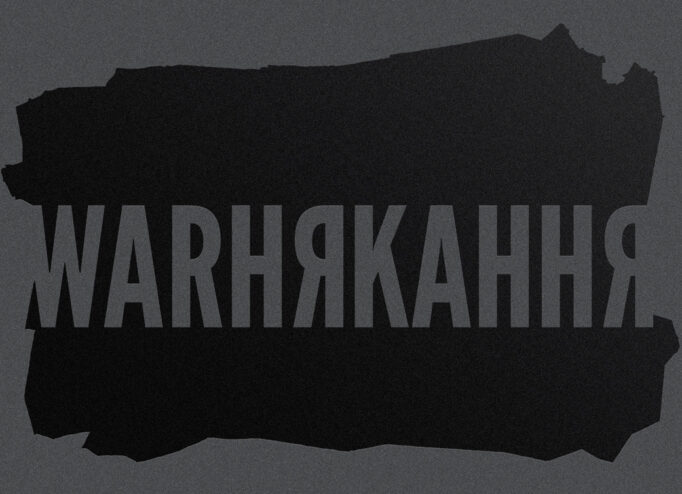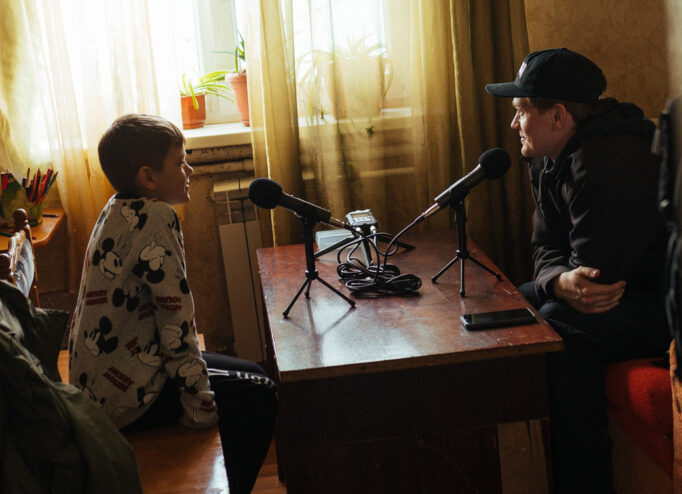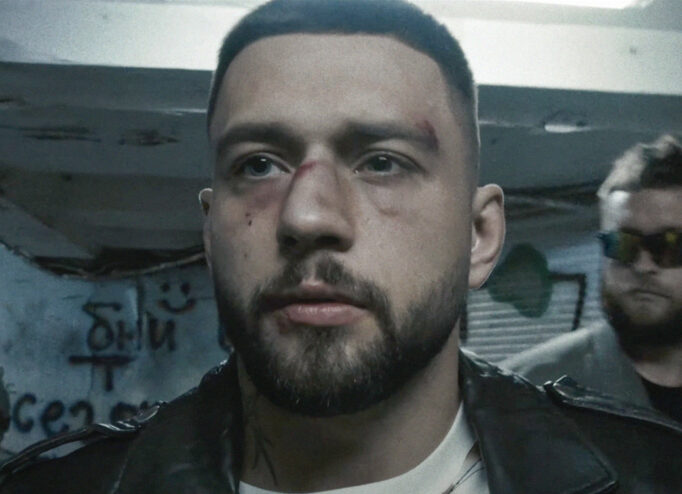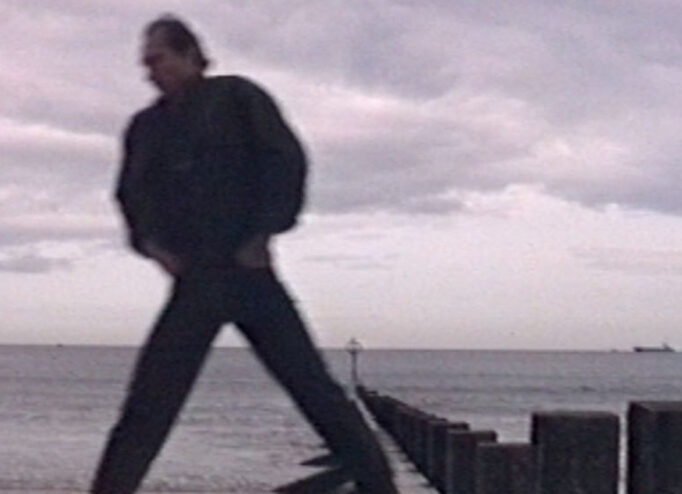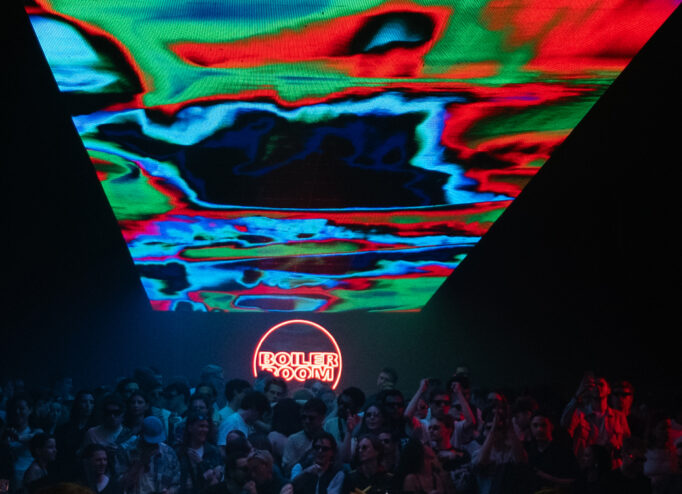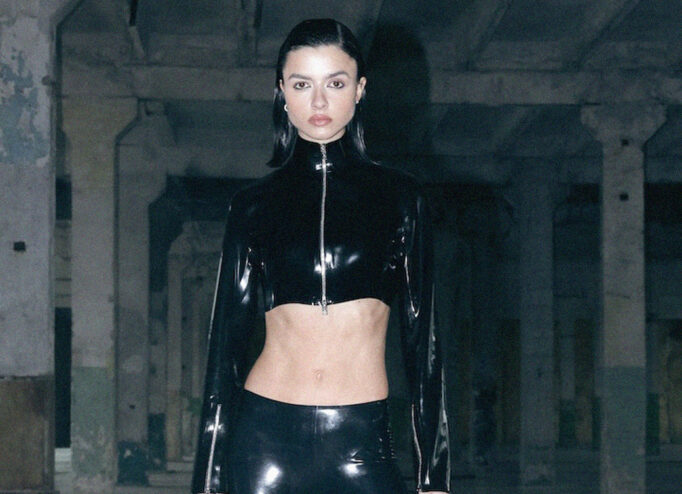The project by Polish curator Marta Chizh and Ukrainian artistic association Open Group, consisting of Yuriy Biley, Pavlo Kovach and Anton Varga, will represent Poland at the Venice Biennale of Contemporary Art, which runs from April 20 to November 24, 2024, The Guardian writes.
The performance video ‘Repeat After Me’ is a continuation of the work created by Ukrainian artists in 2022. Until March 10, 2024, the project can be seen in Lviv Jam Factory art center
What the project is about
‘Repeat After Me’ documents forcibly displaced people from eastern Ukraine who settled in a temporary camp in Lviv. The heroes of the video share their experience of war by reproducing the sounds of different weapons and creating ‘a kind of karaoke instruction’. For example, the displaced people try to reproduce the crack of an AK-47, the sound of artillery fire or air raid signals with their voices.
Переглянути цей допис в Instagram
Even though the sounds of gunshots from different weapons can be transmitted by simple sound sequences, this instruction is still unable to convey the experience of being in the war zone that has become the source of this knowledge.
‘From the moment we hear the first air raid siren, our ‘internal alarm’ is on alert. It keeps us in constant tension and makes us listen to every sound, every rustle. Sometimes suspicion creeps in even in silence’, is how Open Group describes the video installation.
‘Repeat After Me’ features IDPs such as Alla, Antonina, Borys, Kateryna, Iryna, Olena, Svitlana and Yuriy.
Why Open Group represents Poland
First place in the Polish selection for the Venice Biennale 2024 went to the project ‘Polish Exercises in the Tragedy of the World: Between Germany and russia’ by curators Piotr Bernatowicz and Dariusz Karłowicz. It contained 35 works by artist Ignacy Czwartos, including a painting showing Angela Merkel connected to Vladimir Putin by a burning St. Andrew’s cross in the shape of a swastika. The project was meant to ‘reveal the tragic nature of Poland’s 20th century history between two totalitarianisms: communism and Nazism’.
The Polish art community criticized the project ‘for its heavily leaning into a narrative of national victimhood’. Three jury members had signed a protest note against Czwartos’s nomination. In their opinion, ‘Polish Exercises in the Tragedy of the World: Between Germany and russia’ was also at odds with the theme of the Venice Biennale 2024 — ‘Strangers Everywhere’.
Therefore, in December 2023, Polish culture minister Bartłomiej Sienkiewicz announced that the country would be represented at the Venice event by Open Group, the runner-up in the Polish selection for the Biennale 2024.
In 2019, Open Group represented Ukraine at the Venice Biennale with the project ‘The Shadow of Dream (Mriya) Cast upon Giardini della Biennale’. According to the artists’ original plan, the world’s largest transport plane ‘Mriya’ with information about all Ukrainian artists on board was supposed to fly over Venice to cast a shadow over the main location of the Biennale and return to Ukraine. This part of the project never materialized.
The other part of the project took place in the pavilion in Venice — it showed everything related to this airplane flight over Venice, its mythology and criticism.
Ukraine at the Venice Biennale 2024 is to present the project ‘Weaving the Nets’ led by curators Viktoria Bavykina and Max Gorbatskyi. The work refers to the metaphor of weaving a camouflage net as a joint action. Its authors are Ukrainian artists Katya Buchatska, Andrii Dostliev and Lia Dostlieva, Andriy Rachinskiy and Daniil Revkovskiy.
‘These are three separate projects that address different themes, with video and installation as the dominant medium. Each of the projects will talk about different themes, experiences of the other which overlap with the general idea of the biennale. We propose to look at experiences that make the human being different, to analyze the mechanisms of communication and interaction with such experiences. War is very present in all the projects, but in general our work is more about joint action, individual and collective voice, and communication of different experiences’, Gorbatskyi describes ‘Weaving the Nets’.
One of the projects will talk about migration, the image of the migrant, and his/her perception of the context in which he/she exists, which directly appeals to the theme of the Biennale.
In early December 2023, it became known that Ukraine might be left without representation at the Venice Biennale 2024. The curators of ‘Weaving the Nets’ told Livyj Bereh that officials stopped communicating with them and did not allocate money for the organization.
In June, as Bavykina and Gorbatskyi told Livyj Bereh, the coordinator of the project from the Ministry of Culture was Halyna Hryhorenko, with whom they had ‘normal communication’. In July, she left the ministry and Taras Shevchenko, Deputy Minister of Culture and Information Policy of Ukraine for European Integration, was appointed coordinator. The curators were able to contact him only once, and then communication was carried out through his deputies.
‘We can’t get them to forward us all the messages from the Biennale organizers. And when we ask how much money for the project we will receive and when we can count on it, the ministry replies: ‘There is a war in the country, the priority of state funding is to fight the enemy’’, Viktoria and Max noted.
What the Ministry of Culture is saying
In a statement, the Ministry of Culture said that the last time Shevchenko communicated with Bavykina and Gorbatskyi was October 4, 2023 — they had an online meeting. At that time, preparations for the Biennale were discussed, and Shevchenko appointed ‘contact persons from the Ministry of Culture for operational communication’.
Also, the Ministry of Culture ‘presented the curators with advice on attracting additional financial resources and informed them about the specifics of the allocation of public funds in 2024’.
On October 13, 2023, the Ministry of Culture sent out a letter of support to artists participating in the project so that they could apply for individual mobility grants from House of Europe. Also, the Ministry of Culture claims that it has agreed with the Biennale on a rent-free venue for the Ukrainian pavilion, which ‘allowed to save about 4 million UAH of budget funds’.
According to the statement of the Ministry of Culture, they will allocate money for ‘Weaving the Nets’. However, it is unclear exactly how much money they are talking about. The Verkhovna Rada has already adopted the budget for 2024, but the Ministry of Culture must approve its work plan for the next year. It will fix the exact amount of budget financing for the Venice Biennale.
The Ministry of Culture noted that they will provide ‘only partial financial support for the creation and implementation of the national cultural project at the expense of budgetary funds’, noting that the curators of the Ukrainian pavilions ‘always attract additional funds for the project’.
But the curators have already received financial support from international institutions. The Goethe-Institut has helped fund the works of Katya Buchatska, Lia Dostlieva and Andrii Dostliev. Lia Dostlieva and Andrii Dostliev have also received a grant from the British Council. However, the curators and artists need funding for the architecture of the pavilion and payment for logistics.
Bavykina notes that back in June, when the national competition for participation in the Biennale was held, the Ministry of Culture stated that the winning project would be allocated a budget of five million UAH.

